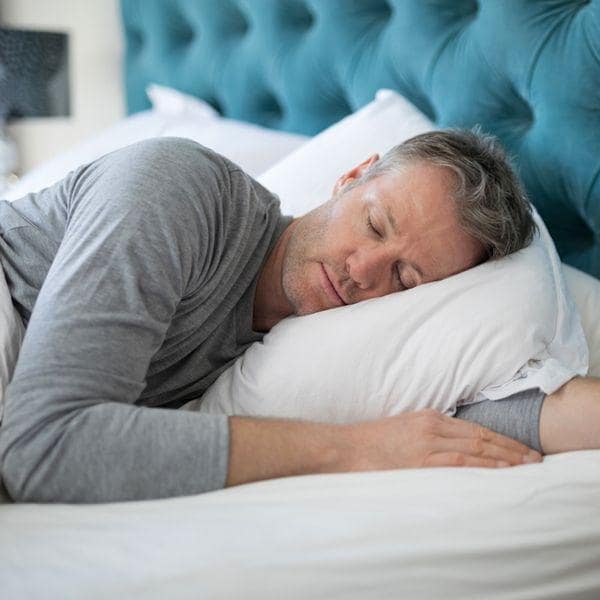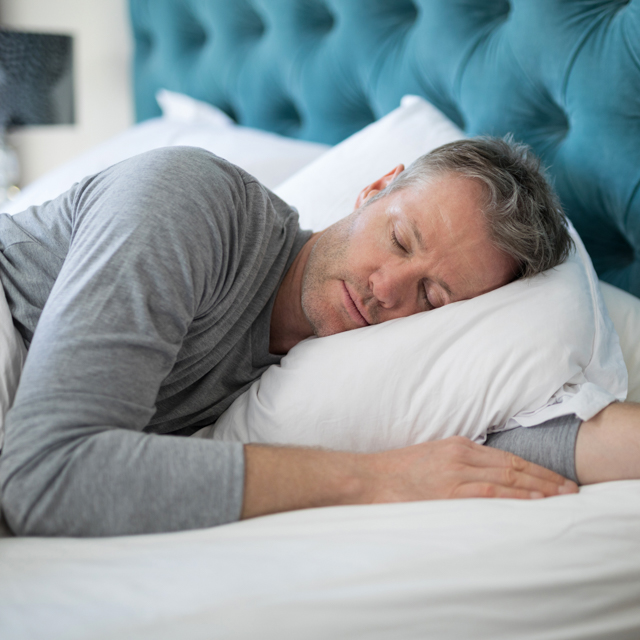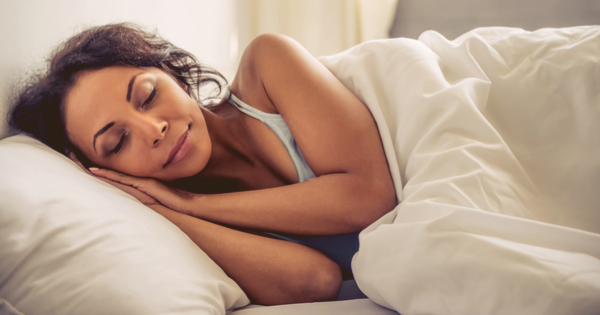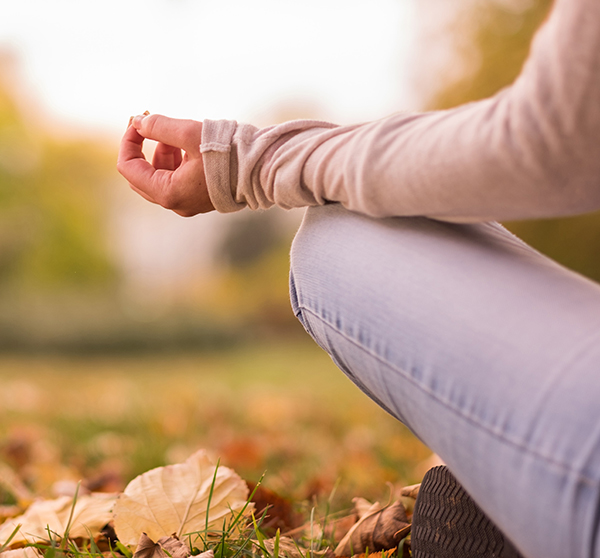Top 10 Sleep Supplements
We’ve all had one of those nights—the kind that leaves us staring at the ceiling at 3am or tossing and turning, searching for sleepy solace. It’s bound to happen every once in a while, especially if you have a habit of getting in some screen time before bed.
But if you’re one of the 40 million Americans that sleep fewer than six hours each night, you already know how that makes you feel: downright sluggish!1 You deserve better.
Luckily, there are supplements that can help you sleep, and they work in various ways. Some influence your GABA receptors, while others mimic natural sleep hormones or simply help your mind and body relax and unwind. Let’s take a look at the science behind some popular sleep supplements to help you choose which is best for you.
1. Melatonin for Sleep
Melatonin is a hormone your body produces naturally to signal that it’s time to sleep, but sometimes your sleep-wake cycle can get thrown off or your body doesn’t make enough natural melatonin. Melatonin supplements may help you get back on track.
Clinical studies show that melatonin supplements can help you fall asleep faster, stay asleep longer, and improve quality for sleep, including for people who work swing-shifts or have jet lag, by mimicking natural melatonin in the body.2 Learn more about melatonin and how much melatonin you need in How Much Melatonin Should I Take?
2. Magnesium Supplements for Sleep
Magnesium is a marvelous mineral that your body needs for hundreds of processes, including muscle relaxation and helping quiet the mind—calming effects that are ever-so-important at bedtime.
Science says magnesium’s calming effects may be related to its role in regulating sleep hormones, including melatonin, and low magnesium levels have been linked to trouble sleeping.2 It’s also great for your bones and so much more. Learn all about magnesium in Magnesium Benefits & Uses.
3. Valerian Root Supplements for Sleep
As one of the most commonly used herbal sleep supplements in both the US and Europe, valerian root’s popularity warrants a closer look.
Most studies on valerian root for sleep are observational and based on self-reporting, however a review of the available research is promising.3 The most commonly reported perk by participants was a perceived improvement in sleep quality after taking between 300-900 mg of valerian root right before bed.2,3
4. L-Theanine Sleep Aid
L-theanine is an amino acid found in tea leaves that boasts some cognitive benefits, but it also has relaxing properties that may help with sleep.
Experts say L-theanine supplements can boost calming brain chemicals, including GABA, serotonin and dopamine, to help you relax.4 It may also help support a healthy response to stress, lowering “excitability” chemicals in the brain.4 L-theanine doesn’t directly make you sleepy the way melatonin can, but its calming properties may be just the help you need to drift off into the land of nod.
5. 5-HTP for Sleep
A precursor to serotonin, 5-HTP (short for 5-Hydroxytryptophan) is used for both mood support and encouraging sleep.
Since serotonin is a precursor to melatonin (triggered when you are in a dimly lit environment), assisting your body’s serotonin production with 5-HTP supplements may lead to better sleep.4 Research suggests that 5-HTP may help you fall asleep faster and sleep longer.5
6. L-Tryptophan for Sleep
You’ve probably heard of L-tryptophan since it’s found in small amounts in turkey and gets blamed for countless Thanksgiving naps. Like 5-HTP, L-tryptophan is a precursor to serotonin, which your body uses to make melatonin.
Research points to L-tryptophan as a serotonergic influencer that can impact cognition, mood and sleep.6 Taking as little as 1 gram a day may improve quality of sleep and help you fall asleep faster.2
7. GABA for Sleep
GABA (short for gamma-aminobutyric acid) is an inhibitory neurotransmitter. It blocks certain impulses between nerve cells in the brain, minimizing activity in the nervous system.7
What does that mean for your sleep cycle? If you’ve ever lain awake with your mind racing at night, low GABA may be to blame. Experts aren’t certain how much ingested GABA makes it to your brain, but research results have noted better sleep and less stress and anxiousness when taking GABA supplements.7
8. Lemon Balm for Sleep
This fragrant herb garden staple contains many active compounds, including antioxidant flavonoids and polyphenols that impart wellness benefits. Researchers say it may help modulate neurotransmitter activity, thus helping with stress, anxiousness and sleep.8
Studies show that lemon balm has a mild sedative effect, promotes relaxation to help you fall asleep more easily, enhances sleep quality, and supports stress relief and a positive mood.8 Research also notes that most people report no side effects. You can enjoy it in a soothing lemon balm herbal tea, or try it in lemon balm supplements.8
9. Chamomile Tea & Supplements
If you’ve ever enjoyed a cup of chamomile herbal tea, you may already know about the relaxing benefits of this famous herb. It’s great mid-day to take the edge off a stressful workday, and later in the evening as a gentle way to unwind.
Science attributes the calming effects of chamomile to apigenin, an antioxidant flavonoid within chamomile that binds to brain receptors related to anxiousness.9 Studies show chamomile can help you fall asleep more quickly and wake up fewer times during the night.9
10. Chinese Skullcap Sleep Benefits
Chinese skullcap is one of the most popular herbs for calming occasional anxiousness, and research shows it can provide a significant lift in mood without reducing energy or cognitive function.10
Since it doesn’t reduce energy or act as a sedative, you’re probably wondering why it’s so popular as a sleep supplement. Sometimes all it takes to help you sleep is a calmer mind, and for that, Chinese skullcap is excellent. Researchers say it works as a GABA modulator, helping minimize stress and worry.11
Supplements for Better Sleep
Whether you need a little help unwinding at the end of a stressful day, getting your sleep back on track after a trip across time zones, or just occasionally have trouble falling asleep, science-backed sleep supplements may be the answer. Always talk with your doctor if you have extended difficulty sleeping and take only the lowest effective dose of sleep supplements or natural sleep aids.
Click here to sign up for Swanson Health emails, including our biweekly wellness newsletter and our top promotions.

About Lindsey Toth, MS, RD
Lindsey is a nationally recognized registered dietitian and nutritionist with a soft spot for pie. She empowers people to take charge of their health by finding the balance between the pleasure and nourishment in food. Her philosophy is that you should take care of your body because it’s the only permanent home you have. It’s what inspired her to pursue a career in nutrition.
*These statements have not been evaluated by the Food and Drug Administration. These products are not intended to diagnose, treat, cure, or prevent any disease.
Sources
1. Short Sleep Duration Among Workers. CDC. Read source
2. 10 Natural Sleep Aids. HealthLine. Read source
3. Valerian for Sleep. National Library of Medicine. Read source
4. What You Need to Know About L-theanine. Psychology Today. Read source
5. Better Sleep with 5-HTP. Psychology Today. Read source
6. Effects of Tryptophan. Neuroscience and Behavioral Reviews. Read source
7. What Does GABA Do? HealthLine. Read source
8. 5 Lemon Balm Uses. University Health News. Read source
9. The 6 Best Bedtime Teas. HealthLine. Read source
10. Efficacy of Scutellaria Lateriflora. PubMed. Read source
11. GABA. National Library of Medicine. Read source




